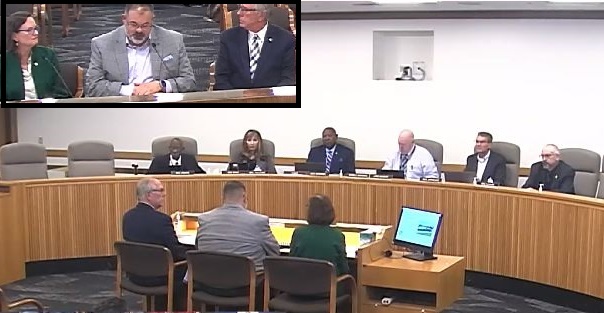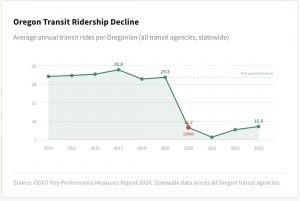Oregon mayors ask for help with homeless crisis
8 min read
Oregon mayors spoke on homelessness during Legislative Days Sept. 28. They described the magnitude of the crisis, said the property tax system fails cities, and asked that cities be integrated into the statewide approach.
Eugene Mayor Lucy Vinis: I am Lucy Vinis, mayor of the city of Eugene, and… I describe the city of Eugene as an emergency room. We are dealing with the emergency on our streets. And that includes not only the need for shelter and services, but also the impact of people living in places not meant for habitation.
[00:00:35] Responding to the public health crisis is costly. We have teams dedicated to removing garbage, bodily waste, the soggy and soiled debris left behind. And it must be done. There is no one else who can do this and there is no possibility of ignoring the profound and negative impact on public health and well-being, access to public spaces, livability of our city, and economic development if we fail to keep our city clean…
[00:01:05] Eugene and its many partners have made huge strides in expanding shelter and services in the last two-plus years. However, the Homeless by Name List still shows more than 4,800 people accessing homeless services in the county. More than 3,500 of those are people in Eugene.
[00:01:24] Despite our investments, the need continues to grow. As a county, state, and nation, we have not stemmed the flow of people into homelessness, which has many causes, not the subject of my comments today. Although the city now has 1,000 shelter beds, we still see more than 2,000 who remain unsheltered on any given night.
[00:01:47] These are folks in tents, under tarps, and in vehicles, many of them not roadworthy. We are responding to 800 complaint calls related to the impacts of people living in public spaces every month. A number that has held steady for two years. Although, frankly, if we had the capacity, we would respond faster and to more complaint calls.
[00:02:10] It is hard to keep up… The city of Eugene cannot shoulder these costs alone.
[00:02:16] Our one-time funds, both from (Gov. Kotek’s) All-In and from the federal American Rescue Plan Act (ARPA) will expire, leaving us facing the likelihood of closing programs we have created. We are asking for continued investment in the (2024) short (legislative) session that would help us maintain the critical programs we’ve built.
[00:02:35] While I am here representing Eugene, I speak for many other cities who need and ask for direct allocations to help us meet the emergency on our streets. While we strongly support robust investment in long-term solutions to address homelessness and are grateful for the governor’s leadership, we cannot wait for permanent housing to be built.
[00:02:57] We must act today and every day to keep our cities clean and safe, and address this humanitarian and public health crisis.
[00:03:09] Salem Mayor Chris Hoy: I am Chris Hoy. I’m the mayor of Salem. Cities in Oregon are the front line of homelessness response. The eight largest cities deal with a vast majority of this crisis every day. Here in Salem, we have done a lot to address this crisis in the past six years…
[00:03:23] Cities in Oregon rely on property taxes. That’s our sole source of revenue to deal with general fund issues. And as you all know, our tax system is broken and it has been broken for a long time. The one-time state and federal funds that we’ve had have been critical in helping address the humanitarian crisis. But if we don’t find new revenue here in Salem, all of the services are going to end in the next two years because our funding system hasn’t adjusted to this new humanitarian crisis that cities are left to deal with.
[00:03:58] In Salem, we receive about $84 million in tax, property tax revenue every year that covers about 45% of the general fund expenses and only 77% of the cost of delivering police and fire. Let me repeat that. We get in property taxes to cover about 77% of police and fire services. That doesn’t account for anything else.
[00:04:22] That doesn’t account for our Center 50+, our parks, our library, all of those other things. We have to come up with other revenue sources and the options on other revenue sources are quite limited. We’ve imposed an operations fee. That’s basically a fee on people’s utility bills every month to help fill the gap.
[00:04:40] In Salem, we’re a little bit unique because, you know, we’re the state capital. So the state owns a lot of property in our city, $1.65 billion worth of real market value within the city of Salem. And yet we still have to provide emergency services. If somebody, heaven forbid, were to call 911 this morning, here in this building, our fire department would respond. The call would go to our 911 center, yet we don’t receive a dime in taxes or any sort of payments to help with those services. It’s quite a burden to be the state capital. We are honored to do that, to be the capital. It is a burden.
[00:05:14] However, there are $5.5 billion in real market value within our city that are exempt from property taxes. If the state were to pay property taxes like everybody else, we would get $7.25 million in our general fund every year, more than we get today. $7.25 million. That would be a game-changer. We could actually respond to these homelessness crisis issues if we had that money, but we don’t. So unless our revenue system adjusts at some point, we’re not going to be able to continue to deal with this homelessness crisis. We just can’t because we can’t even deliver basic services, let alone these additional services.
[00:05:56] I would love to talk about Measures 5 and 50, but I know that you mostly know about those things, so I won’t go into it… But unless we have comprehensive tax reform or some sort of revenue reform, we’re not going to be able to sustain all of these services that we’ve told you about and that we need to provide and that our residents demand.
[00:06:12] We have to fix our tax system in order to really address this problem.
[00:06:17] Hillsboro Mayor Steve Calloway: My name is Steve Calloway and I’m the mayor of the city of Hillsboro and this year’s president of the League of Oregon Cities. I want to start by reminding the committee that homelessness services have never been part of cities’ service mandate. Therefore, our organizations and institutions at the local level were not designed to provide services to community members through shelter development and operations, social service support, supportive housing, and the myriad of other needs and services the homeless population requires.
[00:06:47] Yet you’ll find in cities in every corner of our state, we are stepping into this space and dedicated one-time funding and other scarce resources because cities want to be, and must be, part of the solution. The question begs: Why? Well, first and foremost, just like all of you and our fellow Oregonians, cities see homelessness first for what it is, a humanitarian crisis, and we shouldn’t tolerate it in our state or in our country.
[00:07:14] We know it’s going to take an all-hands-on-deck approach to address this crisis in a meaningful way.
[00:07:20] Second, unsheltered homelessness impacts our housed community members who are increasingly frustrated that government action is not swift enough or effective enough to make a meaningful difference in the community’s safety and livability. And their first stop in expressing that frustration is in city halls across the state.
[00:07:39] Finally, in many communities, unsheltered homelessness is impacting small- and medium-sized businesses that are the backbone of our economy. Their growth and success directly translate to the ability of cities and the state to fund critical infrastructures and services.
[00:07:56] Yet one-time funding is what it is, and there’s no more funding like ARPA on the horizon. So you’ll see gaps in critical local projects, some of which will close within the year if new revenue is not identified. I can tell you that no city in the state is going to have extra general fund revenue to plug these gaps.
[00:08:15] And frankly, many communities are struggling just to keep lights on and basic services provided. Even in larger metro area cities, general fund budgets are being pushed to the limits just to maintain basic city services such as police, fire, parks, transportation. And in other words, without a strong partnership and dedicated ongoing investment from the state, local efforts to provide these critical services that our shared constituents demand is going to be reduced or eliminated over time.
[00:08:44] We owe it to Oregonians, housed or unhoused, not to let that happen…
[00:08:49] Just this year, Bend dedicated $2.6 million in ARPA funds to shelter operations alone. But this one-time funding’s expiring and the situation is dire. They don’t have a replacement source of revenue and needs state support to close the $2.6 million gap…
[00:09:06] Medford has provided safe shelter to individuals who would otherwise still be living outside. Despite these efforts, the number of individuals experiencing homelessness has increased by 55 percent since 2021. They need $3.5 million annually just to maintain operations and meet the rising demand for supportive services. The result of inaction is the closure of these facilities and services in Southern Oregon…
[00:09:33] Cottage Grove dedicated $370,000 of ARPA funding to stand up 33 shelters. They need $265,000 to keep that project operational before the end of the biennium…
[00:09:47] And finally, in Hillsboro, 2023 saw the first reduction in homeless count numbers since 2018 in Washington County, due to coordinated efforts from the county, city, and nonprofit partners. And although these projects have been successful, all of these projects were temporary and funded with help of one-time ARPA dollars.
[00:10:06] They’re an emergency response, but not a sustainable solution.
[00:10:09] Gov. Kotek rightly declared homelessness a state of emergency on her first day in office. And that emergency plays out every day on the streets, parks, plazas, business districts, and neighborhoods in cities across Oregon.
[00:10:22] Yet cities themselves are not integrated into the collective statewide response in a holistic and strategic way. And as I mentioned at the beginning, cities are stepping into this service space for the first time. Organizations were simply not built to provide health and human type services.
[00:10:38] Yet there are obvious and tangible ways cities can and are addressing critical gaps in the current system. We’re filling those gaps as best we can with temporary funding, but we know we can do so much more if we’re integrated into the statewide strategy and if our role is memorialized with stable and flexible funding.
[00:10:56] Again, that allows us to implement the silver buckshot approach instead of looking for one silver bullet. And this will allow each of our communities, the three that you’re hearing today, the three that I mentioned, and the 235 other cities throughout Oregon, to evolve their organization and serve their community most effectively.
[00:11:14] John Q: Oregon mayors describe the humanitarian emergency on their streets. After being shut out by the governor and legislators in 2023, they promise to renew their efforts in 2024 and beyond.






